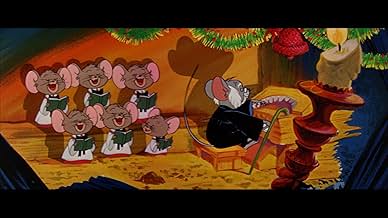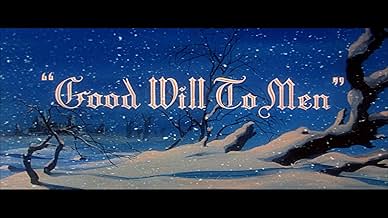Aggiungi una trama nella tua linguaA group of young mice is in the ruins of a church, practicing singing for an upcoming service. After singing an adulterated version of "Hark! The Herald Angels Sing," the mice wonder about t... Leggi tuttoA group of young mice is in the ruins of a church, practicing singing for an upcoming service. After singing an adulterated version of "Hark! The Herald Angels Sing," the mice wonder about the last line, "Good will to men." One of them asks the chorus master, an old mouse, "What ... Leggi tuttoA group of young mice is in the ruins of a church, practicing singing for an upcoming service. After singing an adulterated version of "Hark! The Herald Angels Sing," the mice wonder about the last line, "Good will to men." One of them asks the chorus master, an old mouse, "What are men?" The old mouse explains that they all killed each other off by building bigger an... Leggi tutto
- Regia
- Sceneggiatura
- Star
- Candidato a 1 Oscar
- 1 candidatura in totale
- Preacher Mouse
- (voce)
- (non citato nei titoli originali)
- Young Mice
- (voce)
- (non citato nei titoli originali)
- Singing Mice
- (voce)
- (non citato nei titoli originali)
- Choir Master Mouse
- (voce)
- (non citato nei titoli originali)
Recensioni in evidenza
Hanna-Barbera are better known to me for their more comic-anarchic violence-oriented shows and cartoons, many of them good to classic so there is no complaining here. Like what was said with describing in my review for 1939's 'Peace on Earth' (mentioned by many reviewers, being a cartoon with a similar story and also a message cartoon that is pretty much the same message and subject) that Hugh Harman grows up with one of his most serious and darker efforts, 1955's 'Good Will to Men' sees Hanna-Barbera turning serious and providing one of their most mature and serious works. Again like 'Peace on Earth' this different approach comes off in a good, no great, way.
Of the two, it's hard to say which is preferred of the two. They are both powerful cartoons with a daring subject, weighty themes and an important message that actually is not too irrelevant. For me 'Peace on Earth' packs slightly more of an emotional punch, while 'Good Will to Men' handles its message a touch more subtly while still making its point very forcefully. In terms of quality overall, the two are about equal.
Regardless, 'Good Will to Men' makes a big emotional impact. It packs a very poignant punch and really makes one think about what it's trying to say. The beginning and end scenes are cute but not too sentimental, while the darker content in between provokes thought and moves. Story-wise, it's simple in terms of structure and plot development while still having a good deal going on but this is a good thing, making the cartoon easier to understand and resonate with.
The characters carry the cartoon beautifully, they look adorable in appearance but show stronger personalities than one would expect. Daws Butler shows that he can do much more than comedy and he does a great job at it.
Animation is rich in detail for design and backgrounds, vibrant in colour and crisp. Composer for the prime-era 'Tom and Jerry' cartoons and regular Tex Avery composer Scott Bradley provides a lush and atmospheric music score.
In conclusion, great. 9/10 Bethany Cox
Originally it was titled "Good Will to Men". Probably one of the most effective pieces of cartoon ever made. Since it was created in 1939, it is a nice contrast to the Pro-War propaganda films of the same era.
I would rate this "short" as being on par with such classics as "one froggy evening" for its historical significance.
This newer version was released in 1955 and was nominated for the Best Short Subjects Oscar.
Slowly we realise that men destroyed themselves and all their towns and cities by wars, bombs, and guns. We see footage of men crawling across trenches and fields, setting off machine guns, dropping mushroom bombs on cities.
Finally the cartoon returns to the mice, frightened but wise in their ruined church, with the wise old owl poring over the Bible, a 'good book of rules'.
Well-drawn and tightly-plotted, this cartoon was a worthy Oscar nominee and is still effective after all these years.
As for the story, well, that's a different story. Some may love its risky anti-nuclear message--as the animals recount how mankind wiped itself out with all of their wars. And, for historical reasons, it is an interesting curio from the Cold War. But, it's also INCREDIBLY preachy. On a preachiness scale from 1 to 10, I'd give this one a 47. It is SO preachy about world peace that it actually made me cringe. Nicely animated but awful.
Please note that most reviewers adored it--one calling it 'the Citizen Kane of cartoon shorts', though at least bigtommyboy agreed with me...for what it's worth. It could just be that I am just too cynical for my own good.
Lo sapevi?
- QuizLast Metro-Goldwyn-Mayer (MGM) cartoon produced by Fred Quimby, also the only one he produced alongside William Hanna and Joseph Barbera.
- Citazioni
Reverend Mouse: Peace on earth was a great idea, too bad they didn't practice what they preached.
- ConnessioniFeatured in Steve Reviews: Anti-War Cartoons (2022)
- Colonne sonoreHark! the Herald Angels Sing
(pub. 1856) (uncredited)
Hymn by Charles Wesley (1730)
Music by Felix Mendelssohn (1840)
Performed offscreen by an unidentified male singer and chorus
I più visti
Dettagli
- Tempo di esecuzione
- 8min
- Mix di suoni
- Proporzioni
- 2.39 : 1
- 2.55 : 1

















